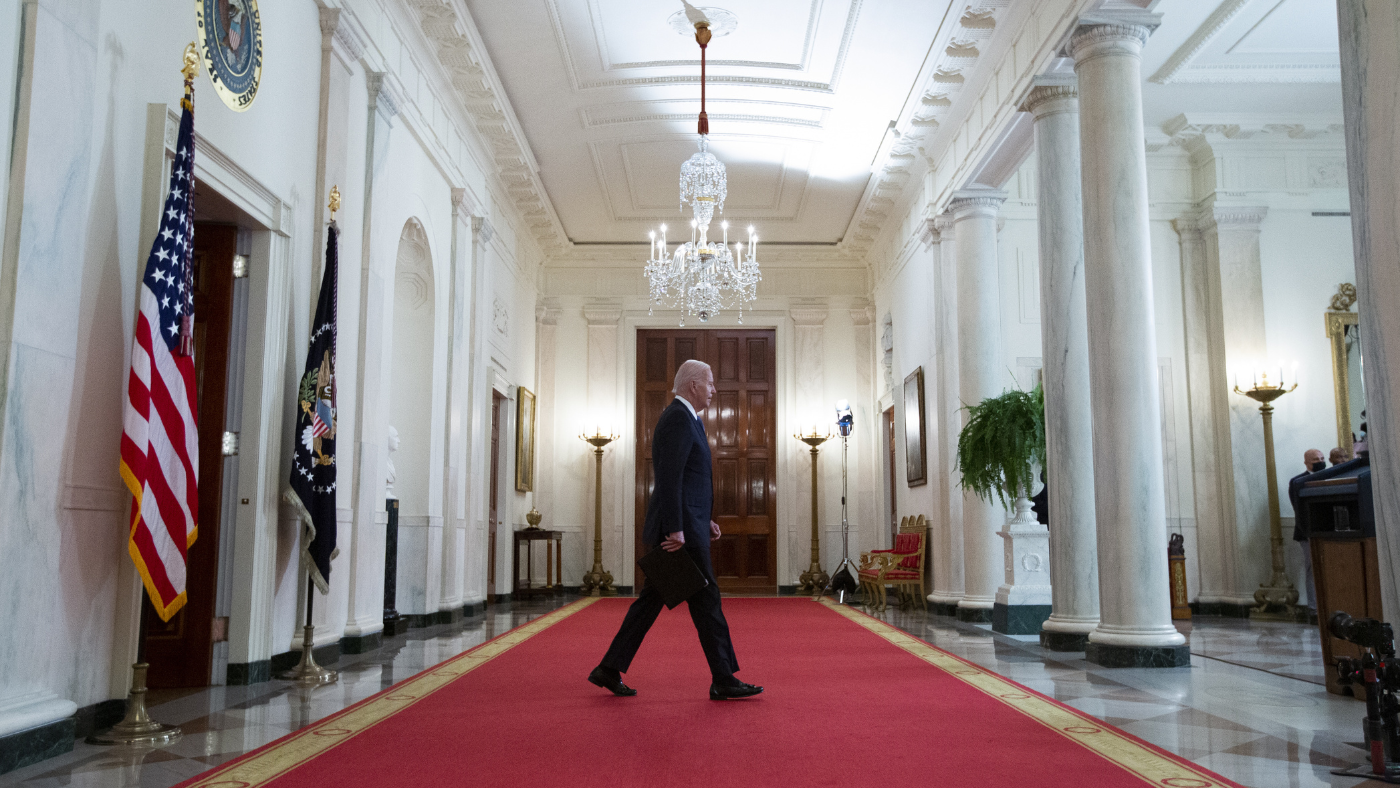‘How many more elephants have to be illegally killed before ministers act?’
Your digest of analysis and commentary from the British and international press

- 1. How many more elephants have to be killed before the government enforces the Ivory Act?
- 2. Overconfident and rebellious – Johnson will rue the day he made a Tory party in his own image
- 3. We all like to snoop just as much as big tech
- 4. If he wants to recover his reputation, David Cameron must pay back his tainted millions
- 5. Edinburgh Festival Fringe may be pared back, but the pleasure is not
A free daily email with the biggest news stories of the day – and the best features from TheWeek.com
You are now subscribed
Your newsletter sign-up was successful
1. How many more elephants have to be killed before the government enforces the Ivory Act?
Luke Pollard in The Independent
on poaching protection
This World Elephant Day, shadow environment secretary Luke Pollard is renewing his call for ministers to activate all powers in the “much-delayed” Ivory Act. “It has been more than 30 months since the Ivory Act was passed in 2018,” Pollard writes in The Independent, yet “ministers have still not brought into force any of its provisions, nor used any of the powers granted”. Elephants are “still at risk of being poached out of existence in the wild”, with the World Wildlife Fund reporting that up to 20,000 African elephants are being illegally killed every year, “equal to 55 per day”. “I sat on the committee which scrutinised the then Ivory Bill in 2018 and was one of the authors of Labour’s amendment to extend the bill to cover ivory from other species (such as the hippopotamus, narwhal, killer whale, sperm whale and walrus),” he continues. But the amendment was “voted down by Conservative MPs at the report stage”. Since then, “instead of enforcing the ban on the ivory trade and making sure it is operating effectively, ministers have been sitting on their hands”, he adds. “How many more elephants have to be illegally killed before ministers act?”
The Week
Escape your echo chamber. Get the facts behind the news, plus analysis from multiple perspectives.

Sign up for The Week's Free Newsletters
From our morning news briefing to a weekly Good News Newsletter, get the best of The Week delivered directly to your inbox.
From our morning news briefing to a weekly Good News Newsletter, get the best of The Week delivered directly to your inbox.
2. Overconfident and rebellious – Johnson will rue the day he made a Tory party in his own image
Martin Kettle in The Guardian
on the PM’s challenges
Boris Johnson is hosting “what is likely to be a knife-edge Cop26 climate summit in Glasgow” this November, says Martin Kettle in The Guardian. At the same time, the prime minister faces “acute political dilemmas at home in which his own future as Conservative leader will be on the line”. And while “compared with the fate of the globe”, that of Johnson is “infinitesimally trivia”, the “two things are interconnected”, Kettle argues. Johnson “is the leader of a Tory party that bridles both ideologically and financially at the hard and expensive choices - on everything from aircraft and cars to home insulation and power generation - that are umbilically linked to his net-zero-by-2050 pledges”. Many Conservatives “have little stomach for an ambitious climate agenda”, fearing that “the disruptions and costs could be politically toxic among poorer former Labour voters in so-called red wall seats”, Kettle writes. On top of this, the Covid pandemic has “opened increasingly deep divisions in the Tory party about what to do when Covid recedes”. Kettle predicts that “all these issues will return to the heart of the government with great force in the autumn and over the coming year. If I was Keir Starmer or Ed Davey, I would be looking forward to this autumn.”
A free daily email with the biggest news stories of the day – and the best features from TheWeek.com
3. We all like to snoop just as much as big tech
James Marriott in The Times
on ‘citizen informants’
We, “the citizen informants of the internet’s surveillance state”, are used to “keeping track of one another online”, so it’s hardly surprising that we’re starting “to do the same in real life too”, writes James Marriott in The Times. The many recent real-life examples include a California truck driver who was fired after being filmed making an “‘OK’ hand gesture at a junction”, and a London lawyer who left his company “after a rival filmed him watching pornography at his desk”. “Whatever you think of the behaviour of those people, the fact they were filmed at all is evidence of a new social norm created by the internet,” says Marriott. “Over the past decade or so we have become accustomed to intruding into other people’s private lives and judging what we see.” Indeed, the “fundamental condition of being online is one of casual surveillance, the constant semi-suspicious monitoring of other people’s private lives”. Yet there may be cause for hope, Marriott argues. “The internet itself has been becoming more private for several years now, as users prefer to communicate in the sealed environments of WhatsApp chats and specialised Facebook groups” rather than in “public arenas” such as Twitter. “If the end of our present era of mass mutual surveillance is to come at all,” he concludes, “it will come, rather ironically, from the internet.”
4. If he wants to recover his reputation, David Cameron must pay back his tainted millions
Stephen Glover in the Daily Mail
on Cameron’s rehabilitation
“David Cameron is not, I think, a bad man,” writes Stephen Glover in the Daily Mail. “But he must be a very unhappy one.” Glover imagines him tossing and turning at night, “fretting and worrying as he considers the mounting charge sheet against him”. The former prime minister “stands accused of greed on an epic scale, of monumentally poor judgment and carelessness”, Glover continues. “I can’t think of any prime minister whose reputation has fallen so precipitously.” When he left office in 2016, Cameron was “admittedly not celebrated as the greatest leader this country has ever known”, but he was “widely considered a man of moderation and good sense”. Now, however, his “reputation has been shattered by his close association with the controversial financier Lex Greensill, and the work he did for Greensill Capital, which went bust in March”. Glover suggests that Cameron might follow the example of “another Tory ex-PM, Stanley Baldwin”, who gave a fifth of his fortune “to help pay Britain’s war debt” after WWI. If Cameron wishes to be rehabilitated, “the path to redemption is to return his ill-gotten gains from Greensill Capital to its creditors, or else give it to charity”.
5. Edinburgh Festival Fringe may be pared back, but the pleasure is not
Anna Hart in The Telegraph
on an intimate festival
In 2019, the Edinburgh Fringe Festival featured nearly 4,000 performances. This year, “it’s 400, plus another 200 online”, writes Anna Hart in The Telegraph. “And yet the atmosphere in the city is still electric.” Reduced listings regardless, “the performers this year are here because they really, really missed performing” and “the audiences are here because we really, really missed performances”. Among locals, meanwhile, there’s a sense of relief, not only that the Fringe is back but also “that it isn’t back in the same guise as 2019”. Hart cites a local pal’s comments that “the festival feels like it belongs to Edinburgh again. It’s the first time in years we’ve looked forward to the festival, rather than secretly dreading it - we can still get across town, and get tickets for the hot shows.” Even though this year’s programme “is pared back” with smaller crowds, Hart says, the “enjoyment levels” are “perhaps higher than ever”. So “can we really say this isn’t one of the festival’s finest years?”
-
 What are the best investments for beginners?
What are the best investments for beginners?The Explainer Stocks and ETFs and bonds, oh my
-
 What to know before filing your own taxes for the first time
What to know before filing your own taxes for the first timethe explainer Tackle this financial milestone with confidence
-
 The biggest box office flops of the 21st century
The biggest box office flops of the 21st centuryin depth Unnecessary remakes and turgid, expensive CGI-fests highlight this list of these most notorious box-office losers
-
 Boris Johnson shocks UK by resigning from Parliament
Boris Johnson shocks UK by resigning from ParliamentSpeed Read
-
 Bees delay flight for three hours
Bees delay flight for three hoursfeature And other stories from the stranger side of life
-
 The Week Unwrapped: Lost tribes, celebration shaming and Edinburgh blues
The Week Unwrapped: Lost tribes, celebration shaming and Edinburgh bluespodcast Was “the Man of the Hole” the last of his kind? Are footballers over-celebrating? And is Edinburgh feeling less festive?
-
 ‘The UK’s malaise will not end with the Prime Minister’s exit’
‘The UK’s malaise will not end with the Prime Minister’s exit’Instant Opinion Your digest of analysis from the British and international press
-
 ‘Police tactics are not getting worse, they are simply being filmed’
‘Police tactics are not getting worse, they are simply being filmed’Instant Opinion Your digest of analysis from the British and international press
-
 ‘G7 leaders missed a golden opportunity’
‘G7 leaders missed a golden opportunity’Instant Opinion Your digest of analysis from the British and international press
-
 ‘It takes some soul searching to celebrate Canada Day’
‘It takes some soul searching to celebrate Canada Day’Instant Opinion Your digest of analysis from the British and international press
-
 ‘Breakthrough on abortion rights could be there if Biden reaches for it’
‘Breakthrough on abortion rights could be there if Biden reaches for it’Instant Opinion Your digest of analysis from the British and international press